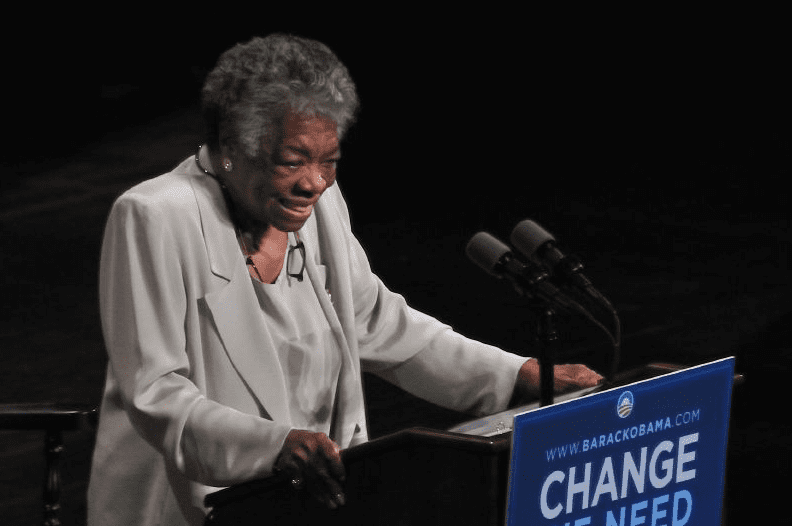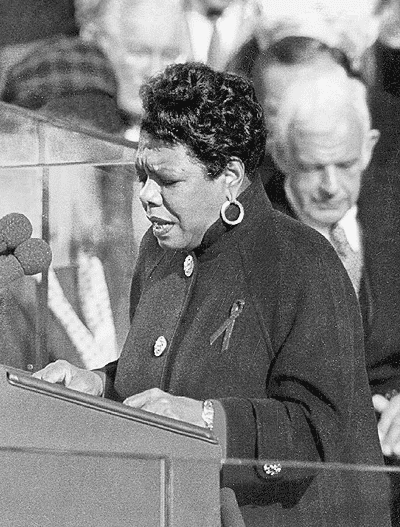Calling someone a “Renaissance” person is an overused – and overblown – term these days. If a rock guitarist paints a portrait, the critics gush that he is a “Renaissance man.” However, America – and the whole world – truly did lose a Renaissance woman on 28 May 2014 when the remarkable Maya Angelou died.
Born in poverty on 4 April 1926 in St. Louis, Angelou experienced and accomplished more in her 86 years than is almost imaginable. In alphabetical order, she was an: activist, actress, artist, author, dancer, director, composer, cook, editor, journalist, mother, musician, nightclub performer, playwright, poet, professor, prostitute, producer, screenwriter, singer, speaker, streetcar conductor and waitress.

An advocate for women in general and African American women in particular, Angelou was also active in the Civil Rights Movement. She was a friend of Malcolm X, Martin Luther King, Jr., and Nelson Mandela, and a mentor to Toni Morrison and Oprah Winfrey. She maintained a large circle of friends and associates, including prominent politicians, activists, entertainers and writers. Angelou recited her poem “On the Pulse of Morning” at President Bill Clinton’s inauguration in 1993.

She produced and directed movies, plays and television programs. Angelou wrote seven autobiographies (including I Know Why the Caged Bird Sings, 1969), several volumes of essays and poetry, and could speak seven languages. She was recognized, appreciated and praised, receiving more than 50 honorary degrees and dozens of awards – including nominations for a Pulitzer Prize, Tony Award, and Emmy Award; winning three Grammys; and receiving the National Medal of Arts, the Lincoln Medal, and the Presidential Medal of Freedom.
[search_box]
The astonishing extent of Angelou’s life accomplishments was mentioned prominently in her obituaries, such as this one from the Associated Press published in a Vermont newspaper – note she is immediately identified as a “renaissance woman.”
The Renaissance aspect of Angelou’s long life was also featured in the lead of this newspaper obituary.
Angelou spent much of her childhood in Stamps, Arkansas, and this Arkansas newspaper published an extensive obituary about her, with this lead.
Obituaries are a key resource for family history research. Although vital statistics can be found in government and other official records, it is newspaper articles – and especially obituaries – that go beyond the names and dates to provide the stories of our ancestors, to help us get to know them as real people.
For example, later in the above obituary comes this little tidbit from Angelou.
The obituary from the Ohio newspaper above provided this detail about her first name.
This obituary from a West Virginia newspaper provided a story about the close relationship that Angelou maintained with Coretta Scott King, widow of the slain civil rights leader.
And finally, this obituary from a North Carolina newspaper provided an insight into Angelou’s character.
It isn’t just obituaries that provide stories about our ancestors. GenealogyBank’s Historical Newspaper Archives – more than 6,700 titles from 1690 to today – have more than 3,400 articles about Maya Angelou.
[search_box]
Of particular interest in these online newspaper archives is GenealogyBank’s African American Newspaper Archives. From that collection we gain the following perspectives on Maya Angelou.
This African American Kansas newspaper said this of Angelou.
This African American New York newspaper reported on one of Angelou’s many speaking engagements.
This African American Michigan newspaper reported on another of her speaking engagements.
This African American newspaper from Wisconsin reviewed Angelou’s 1969 autobiography.
As these examples from GenealogyBank’s Historical Newspaper Archives have shown, obituaries and other newspaper articles can give us a fuller understanding of Maya Angelou’s remarkable life, broad experiences, and many achievements. Genealogy is about so much more than mere statistics; names and dates don’t tell the complete story of a person’s life. To better understand our ancestors’ lives and the times they lived in, we need the stories forever preserved in online newspaper archives.
Note: FamilySearch International (FamilySearch.org) and GenealogyBank are partnering to make over a billion records from historical obituaries searchable online. The tremendous undertaking will make a billion records from over 100 million U.S. newspaper obituaries readily searchable online. The newspapers are from all 50 states and cover the period 1730 to the present. Find out more at: https://www.genealogybank.com/family-search/
Related Articles:
- Elizabeth Cady Stanton, Jackie Robinson & Rosa Parks Obituaries
- Rosa Parks Statue: Honoring an American Civil Rights Pioneer
- Dr. Martin Luther King Jr: Brief Genealogy & Family Tree Download
[bottom_post_ad]